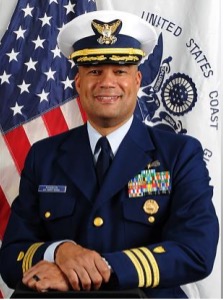Commander Steve C. Mannion ’93
Judge Advocate General, United States Coast Guard
 CDR Steve Mannion was designated an Appellate Military Judge and a Judge Advocate
in 2021. He previously served 17 years in boat forces assignments, earning the Boat
Forces Operations (Advanced) Insignia, the Navy Small Craft OIC Insignia, and the
Navy Mission Commander qualification.
CDR Steve Mannion was designated an Appellate Military Judge and a Judge Advocate
in 2021. He previously served 17 years in boat forces assignments, earning the Boat
Forces Operations (Advanced) Insignia, the Navy Small Craft OIC Insignia, and the
Navy Mission Commander qualification.
Why Seton Hall Law?
I chose Seton Hall Law because of its great reputation and proximity to my family
in New Jersey.
What was your motivation to join the military, and what in your career or undergrad
made you think about law school?
I joined the military three times and each time for a different reason. I joined the
Marine Corps as an officer candidate during college because of the Cold War. After
telling my Marine selection officer (recruiter) of my interest in becoming a lawyer,
he told me that military attorneys are JAGs and the best JAGs become military judges.
That set me on my course toward law school and the bench.
Years later, I joined the New Jersey State Guard because I missed the camaraderie of military service. My first drill was two days before 9/11.
Lastly, I joined the Coast Guard Reserve to help better protect my family, community, and country after my wife survived the 9/11 terrorist attacks at the World Trade Center.
You have been both a reservist and in active duty, what are the unique challenges
in balancing that and a legal career?
The greatest challenge for most reservists is finding a civilian employer who will
truly support and not simply tolerate their continued military service. Most employers
are happy to hire veterans, but many are reluctant to make the additional commitment
of hiring, retaining, and promoting drilling reservists who are unavailable one weekend
per month, for two weeks of annual training, and may be mobilized in response to any
contingency or national emergency.
How has your service guided your career in the law, what has inspired this work or
passion?
"God, Country, and Corps" were the priorities drilled into me during the Marine Corps
Platoon Leaders Course. For me, this has evolved to God, country, court, Coast Guard
and community. These are an order of priorities and recognition that military service
members and civilian employees of the government should not follow unlawful orders
and not prioritize any military component, branch of government, or any one official
above the U.S. Constitution. These priorities have guided me through difficult times
in both of my careers.
When I joined the Coast Guard Reserve, I was already well established as a litigator who defended good cops in civil litigation and prosecuted bad cops for termination or suspension. I understood that Coast Guard officers are at all times both military and law enforcement officers, however, I then had no desire to serve in a law enforcement role. I was assigned to what was known as a Sea Marshal unit. Sea Marshals were maritime law enforcement officers responsible for ensuring that commercial ships could not be used as weapons or terrorist platforms as the ships entered or exited major sea ports.
Petty Officer Ben Booth was one of our most experienced Sea Marshals. He was a law enforcement instructor, had been cross-deputized by the U.S Marshal, and was featured on the cover of Coast Guard Magazine as the model for maritime law enforcement. None of that, however, prevented local law enforcement in New York state from racially profiling Ben and then arresting him for unlawful possession of a handgun. Federal authorities subsequently charged Ben with unlawful purchase of rifle that he kept at his home in New York. Ben was firmly in the cross-hairs of federal and state prosecutors as well as his Coast Guard superiors, Coast Guard prosecutors and the local Coast Guard Investigative Service (internal affairs).
Although it was made clear to me that our Coast Guard command supported Ben's prosecution, I agreed to represent Ben in both cases in my capacity as a private attorney. I prioritized country, i.e., our Constitution over the Coast Guard. Coast Guard leadership clearly did not want boarding officers to carry personal firearms off duty, but the Constitution empowers Congress with legislative authority and Congress authorized qualified law enforcement officers to carry concealed firearms nationwide notwithstanding state laws or individual agency policies to the contrary. The New York state court agreed in a published decision and dismissed all charges against Ben Booth.
Likewise, I convinced the U.S. Attorney's Office to drop its charges and the Coast Guard did not file charges against Ben under the Uniform Code of Military Justice. The Coast Guard subsequently recognized that boarding officers can carry personal firearms off-duty. It has also since forbade its JAG officers from appearing in state courts to prosecute members as happened with Petty Officer Booth.
Even though my decision to represent Ben was controversial within the Coast Guard in 2008, doing so was one of the reasons I received the Judge Advocates Association's 2022 Outstanding Career Judge Advocate Award.
Where did you attend undergraduate? Was the idea of service part of your undergrad
experience?
Gettysburg College, which is surrounded by the Gettysburg battlefields, introduced
me to military service through U.S. Army ROTC. I volunteered for ROTC and competed
as a member of the Ranger Challenge Team during my freshmen and sophomore years. That
experience solidified my commitment to military service which has been part of my
family history since at least the Civil War.
Was there a class or faculty member that was instrumental in your legal career and
trajectory?
Yes. I took a class in African History at Gettysburg College with a professor from
Nigeria. This was my first academic opportunity to receive professional instruction
about my African heritage from a college professor from the continent. The class,
however, taught about European colonialism and little to nothing about the cultures
and histories of African civilizations.
Despite my disappointment with the course material, the professor inspired me to strive for academic excellence and to travel to the continent. I subsequently interned with the International Commission of Jurists in Nairobi, Kenya to help document human rights violations by police. While there, two police officers detained me at gunpoint and with a canine under suspicion of being an illegal American alien while a local friend negotiated a sufficient gratuity for my release.
This, and other experiences of being racially profiled in the U.S., contributed to the interest in my dual careers of teaching proper law enforcement practices within the Coast Guard and holding civilian police officers accountable for disciplinary infractions.
Looking back, how has Seton Hall Law prepared you to serve in the prominent positions
you have held?
Seton Hall Law provided me with an excellent legal education and networking opportunities
that led to my initial employment during law school which led to the subsequent positions
that prepared me for the bench.
You are recently become involved with our alumni Veteran's and Military Affiliated
Alumni Committee, and presented on a panel - what fuels your passions for volunteering?
Love of freedom fuels my passion. I volunteer to do my part for our veterans so that
we continue to live in a great country. I meet people every day in immigration court
from around the world whom are willing to risk their lives and the lives of their
children for even a slim chance to enjoy our freedom. Freedom is fragile and would
cease to exist without enough good people willing to serve in our armed forces.
Most Americans have not served in the military and do not have friends or family who have served. For the first time in the last twenty years, every military branch, including the Coast Guard, is having difficulty recruiting qualified Americans to serve. It is not a coincidence our society is more disconnected from those who serve in the military and from veterans than at any time in recent memory.
By serving those who have served, I honor their service and hope to encourage the military service of others who will ensure our continued freedoms.
What advice would you have to veterans applying to law school or those seeking a Military
career after law school?
The first career advice I ever received was from my Marine selection officer. He asked
what I wanted to do after the Marine Corps and I had no idea. He told me that Marine
officers could lead grunts, fly, or practice law. He advised that I take a flight
exam and the LSATs to explore my options and have more opportunities for a post-military
career.
My advice is the same. Determine what you want from military service and then have an exit plan. If you want a twenty-year career of active-duty you can retire and fish after or build the skills for a second career. The choice will be yours.
To learn more about the Veterans Committee at Seton Hall Law, email [email protected] or call (973) 642-8711.

